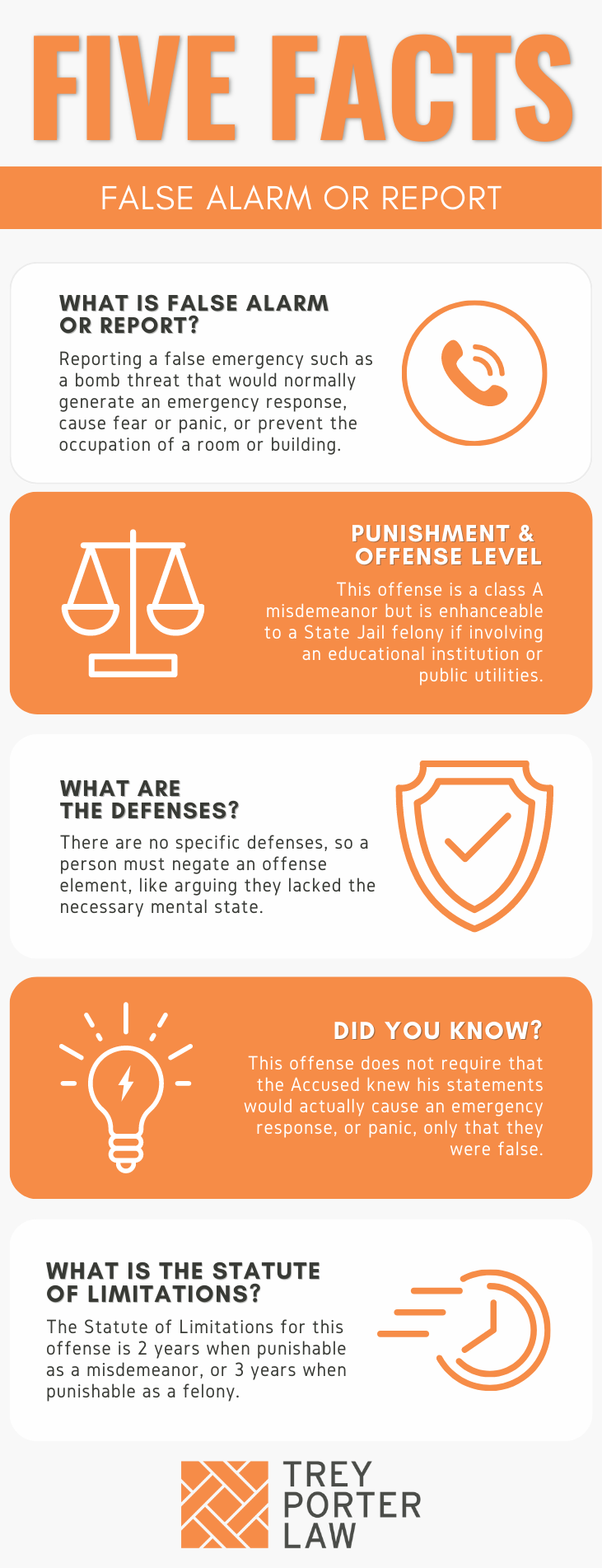WHAT IS FALSE ALARM OR REPORT IN TEXAS?
The Texas law against false alarm or report prohibits reporting emergencies a person knows to be false that would place others in fear, cause an emergency response, or cause people to evacuate a building, aircraft, or other place or mode of transportation.
WHAT IS THE FALSE ALARM OR REPORT LAW IN TEXAS?
Tex. Penal Code § 42.06. FALSE ALARM OR REPORT.
(a) A person commits an offense if he knowingly initiates, communicates or circulates a report of a present, past, or future bombing, fire, offense, or other emergency that he knows is false or baseless and that would ordinarily:
(1) cause action by an official or volunteer agency organized to deal with emergencies;
(2) place a person in fear of imminent serious bodily injury; or
(3) prevent or interrupt the occupation of a building, room, place of assembly, place to which the public has access, or aircraft, automobile, or other mode of conveyance.
(b) An offense under this section is a Class A misdemeanor unless the false report is of an emergency involving a public or private institution of higher education or involving a public primary or secondary school, public communications, public transportation, public water, gas, or power supply or other public service, in which event the offense is a state jail felony.
WHAT IS THE PENALTY CLASS FOR FALSE ALARM OR REPORT IN TEXAS?
False alarm or report is a Class A misdemeanor under most circumstances, punishable by up to one year in jail. It is a state jail felony, punishable by 180 days to two years in a state jail facility, if a person falsely reports an emergency involving a public or private institution, a public primary or secondary school, public communications, transportation, water, gas, or power supply, or other public service.
WHAT IS THE PUNISHMENT RANGE FOR FALSE ALARM OR REPORT IN TEXAS?
False alarm or report charged as a Class A misdemeanor carries up to one year in jail, and a maximum fine of $4,000. A person charged with state jail felony false alarm or report faces between 180 days and two years in a state jail facility, and a maximum $10,000 fine.
WHAT ARE THE PENALTIES FOR FALSE ALARM OR REPORT IN TEXAS?
A person charged with false alarm or report may be eligible for probation after a conviction, or deferred adjudication without a conviction. The maximum period of community supervision for a Class A misdemeanor is two years. For a state jail felony, the term of community supervision ranges from two to five years, with the possibility of extending supervision for up to ten years.
WHAT ARE THE DEFENSES TO FALSE ALARM OR REPORT IN TEXAS?
The statute does not authorize specific defenses to false alarm or report. A person accused thereof may attempt to negate at least one of the elements the State must prove at trial.
WHAT IS THE STATUTE OF LIMITATIONS FOR FALSE ALARM OR REPORT IN TEXAS?
The limitation period for false alarm or report categorized as a Class A misdemeanor is two years. For a state jail felony, the limitation period is three years.
FALSE ALARM OR REPORT IN TEXAS
Reporting, communicating, or circulating the existence of an emergency the person knows is false or baseless may be charged as false alarm or report. If, however, a person reports a crime that is not necessarily an emergency, he may be charged with false report to a peace officer.
TEXAS FALSE ALARM OR REPORT COURT CASES
The case law regarding false alarm or report in Texas gives examples of the types of statements likely to place others in fear, or cause emergency personnel to act.
- In In re C.M.W., a high school student told his classmates numerous times over a two-week period that he was going to shoot everyone at school and blow it up. The classmates reported the threats to the vice-principal, who spoke to the student, then called police.The student claimed he was just repeating what other people said, and admitted to talking about a “Columbine-style shooting.” A jury found he made a false alarm or report, and the appellate court affirmed. There is no requirement that he knew his statements would actually cause an emergency response, just that they were false.













